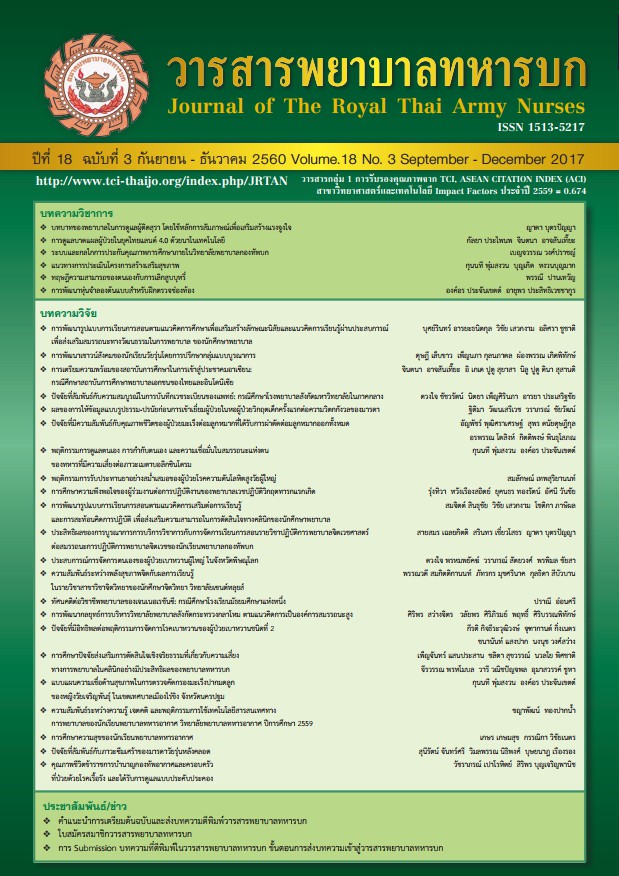ปัจจัยที่มีอิทธิพลต่อพฤติกรรมการจัดการโรคเบาหวานของผู้ป่วยเบาหวานชนิดที่ 2
Keywords:
พฤติกรรมการจัดการตนเอง, ความสามารถแห่งตน, แรงสนับสนุนทางสังคม, ผู้ป่วยเบาหวานชนิดที่ 2, Self-management behavior, Self-effcacy, Social support, Type 2 Diabetes Mellitus PatientsAbstract
การวิจัยนี้เป็นการหาความสัมพันธ์เชิงทำนายเพื่อศึกษาพฤติกรรมการจัดการตนเองและปัจจัยทำนายพฤติกรรมการจัดการตนเองของผู้ป่วยเบาหวานชนิดที่ 2 ในจังหวัดพิษณุโลก มีขนาดตัวอย่างจำนวน 536 คน เก็บข้อมูลโดยใช้แบบสอบถามประกอบด้วยข้อมูลส่วนบุคคล ความรู้ ความสามารถแห่งตน แรงสนับสนุนทางสังคมและการจัดการตนเอง ตรวจสอบความตรงเชิงเนื้อหาได้ 0.89 และค่าความเชื่อมั่นของความรู้ได้ค่า KR-20 เท่ากับ 0.75 และความสามารถแห่งตน แรงสนับสนุนทางสังคมและการจัดการตนเอง ด้วยค่าสัมประสิทธิ์แอลฟาครอนบาคเท่ากับ 0.79, 0.83 และ 0.86 ตามลำดับ วิเคราะห์ข้อมูลโดยสถิติเชิงพรรณนาและสถิติถดถอยพหุคูณแบบขั้นตอนผลการวิจัยพบว่ากลุ่มตัวอย่างมีคะแนนพฤติกรรมการจัดการตนเองระดับปานกลาง ร้อยละ 70.7 (mean = 75.09, S.D. = 8.5) ผลการวิเคราะห์ปัจจัยทำนายพบว่า ความสามารถแห่งตน (B = 0.63) แรงสนับสนุนทางสังคม (B = 0.28) และความรู้ (B = -0.66) โดยตัวแปรทั้ง 3 ตัว ร่วมอธิบายความแปรปรวนของพฤติกรรมการจัดการตนเองได้ร้อยละ 32.7 อย่างมีนัยสำคัญทางสถิติที่ระดับ .05 จากผลการวิจัยมีข้อเสนอแนะให้บุคลากรสาธารณสุขควรมีออกแบบวิธีการให้ความรู้แก่ผู้ป่วยในการดูแลตนเองโดยเสริมสมรรถนะแห่งตน สร้างแรงสนับสนุนทางสังคม และจัดวิธีการให้ความรู้ที่เหมาะสม ครอบคลุมปัจจัยระดับบุคคลและระหว่างบุคคล อันจะนำไปสู่การสร้างเสริมพฤติกรรมการจัดการตนเองในผู้ป่วยเบาหวานชนิดที่ 2
Factor Influencing Diabetes Self-Management Behavior among Type 2 Diabetes Mellitus Patients
This predictive correlation research aimed to assess the self-management behavior and to identify factors influencing diabetes self-management behavior among Type 2 diabetes mellitus patients (T2DM) in Phitsanulok Province. Sample size determination was 536 T2DM. Collecting Data with questionnaire include demographic questionnaire, knowledge, self-effcacy, social support, and self-management behavior. The content validity was verifed by Item-Content Validity Index (I-CVI), obtained 0.89. The reliability of knowledge questionnaire was confrmed by KR-20, yield 0.75. In addition, the self-effcacy, social support, and selfmanagement behavior questionnaire were prove by Cronbach’s alpha coeffcient, got 0.79, 0.83, and 0.86 respectively. Data were analyzed by using descriptive statistics and stepwise multiple regression analysis. The results show that mostly of T2DM had the scores of diabetes self-management behavior at a moderate level (70.7%), with the mean score 75.09 (S.D. = 8.5) In addition, stepwise multiple regression analysis indicates that self- effcacy (B = 0.63), social support (B = 0.28), and knowledge (B= -0.66) accounted for 32.7% of self-management behavior among T2DM with the signifcance level of p-value < .05 Based on the fndings, it is recommended that healthcare personnel should be design diabetes self-management education by considered on empowering self-effcacy, enhancing social support, designing appropriate programs in assisting to delivery of diabetes self-management education, cover individual and interpersonal factors. These activities will lead to improve self-management behavior of T2DM.
Downloads
Downloads
Published
How to Cite
Issue
Section
License
บทความหรือข้อคิดเห็นใดใดที่ปรากฏในวารสารพยาบาลทหารบกเป็นวรรณกรรมของผู้เขียน ซึ่งบรรณาธิการหรือสมาคมพยาบาลทหารบก ไม่จำเป็นต้องเห็นด้วย
บทความที่ได้รับการตีพิมพ์เป็นลิขสิทธิ์ของวารสารพยาบาลทหารบก
The ideas and opinions expressed in the Journal of The Royal Thai Army Nurses are those of the authors and not necessarily those
of the editor or Royal Thai Army Nurses Association.






